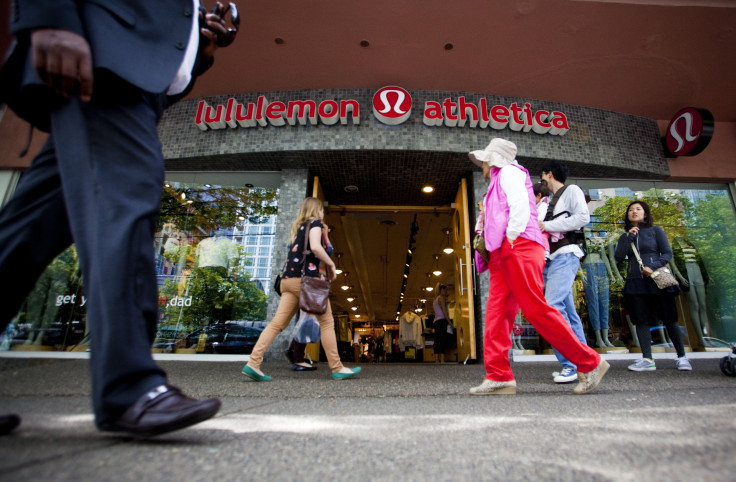Lululemon Earnings Preview: Retailer Poised To Regain Footing After Transparent Yoga Pants Recall

More than a year after Lululemon recalled some of its yoga pants for being somewhat transparent, the high-end athletic apparel maker is poised to regain market share it lost to larger competitors like Nike and Under Armour. The shift, analysts say, reflects the growing market for fashionable women's athletic gear, even as shoppers spend less overall on clothing.
Just a few quarters ago, Lululemon’s sales still hadn't recovered from the March 2013 recall of about 17 percent of its yoga pants. Customers were concerned that bending and stretching rendered the fabric see-through. When the company reports quarterly earnings Thursday before markets open, many analysts expect to see a rebound in sales. Analysts polled by Yahoo Finance estimate revenue at $424 million with earnings per share of 38 cents, less than earnings per share of 45 cents in the same period last year but a 10.4 percent increase in revenue from a year ago.
“We are encouraged by the improvements in logistics, supply chain processes, and product that Lululemon has made this year, and believe the company is back on track to becoming a sustainable, successful global brand,” said Robert Drbul, an analyst for Nomura, in a recent note. “We believe customers have renewed faith in the design and quality, and believe the reputation and logistical issues of 2013-2014 are largely behind the company.”
Wells Fargo analyst Paul Lejuez upgraded shares of Lululemon Tuesday to Outperform from Market Perform, writing in a note to clients that his team has always viewed the company as an attractive store growth story, but product issues and management turnover made them less confident. Now the company has improved its supply chain, and management can focus again on store and sales growth, he argues. The athletic category is “so strong” that Lululemon will likely benefit for years, Lejuez said.
In the past two decades, the number of people ritually participating in yoga, pilates, Zumba, boot camps, Crossfit and other fitness alternatives has skyrocketed. The pilates and yoga studios industry was the fourth-fastest-growing industry in 2012, behind for-profit universities and 3D printers, and that trend has continued through last year and this year, according to IBIS World.
That yoga pants are becoming the new jeans is no secret. Sales of comfy, chic clothes, dubbed “athleisure,” have grown at twice the rate as sales of more traditional apparel this year, according to Barclays research. Even retailers like Urban Outfitters, American Eagle and H&M are making neon sports bras and other female-inspired athletic clothing in search of sales growth. But the technical nature of athletic apparel give brands like Lululemon an advantage, at least among shoppers willing to spend $100 on a pair of yoga pants, Barclays analysts say. Barclays also compared Google search activity for Lululemon to other brands like Juicy Couture and Ugg that have encountered challenges over the last five years and found that while a decline in search activity corresponded with the other brands' sales fallouts, more Google users have been searching for Lululemon products than since the peak holiday period in 2012.
A large part of Lululemon’s early success was capturing the yogawear niche as it emerged in popularity. As Nike, Under Armour, Gap’s Athleta line and others entered the space, Lululemon has played up its relative smallness. Rather than sponsor professional athletes like Nike, Lululemon gives local yoga teachers a few shirts and bottoms, professionally photographs them and displays the photos on massive canvases around the store as free advertising for the teachers’ classes. The store associates, dubbed educators, also dote on customers by name.
Now Lululemon is planning to expand its menswear business and open more stores internationally, hoping to increase its cult following in markets where the impact of last year’s recall hasn’t reverberated. The company’s first London store exceeded its sales target by 60 percent earlier this year.
© Copyright IBTimes 2024. All rights reserved.






















